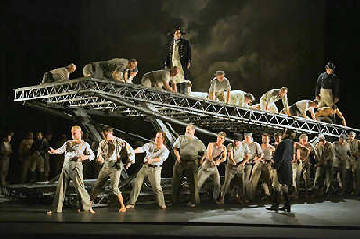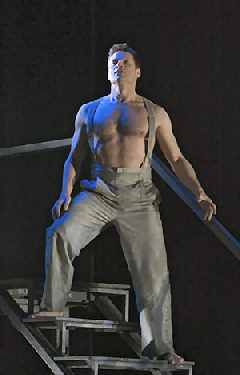|
Editor:
Marc Bridle
Webmaster: Len Mullenger
|
Seen and Heard Opera
Review
Britten, ‘Billy
Budd’: English National Opera, conductor Andrew Litton,
3.12.2005 (ME)
THE
‘INDOMITABLE’ ENO SAILS ON! Why the capitals, I hear you
ask? Well, I was just getting rather fed up with all those
headlines screaming things like ‘WHAT IS THE ENO FOR?’ and
all that easy copy about crises, being provided for the
latest semi-literate protégé of whichever ‘Arts Editor’
you care to name - of course, what some would really like
is for ENO to fold, thus allowing their beloved Royal Opera
to sail off into the sunset, trailing clouds of glory in
the shape of yet more subsidy and corporate jollifications.
Margaret Thatcher once ominously inquired ‘Why does London
need two opera houses?’ and that of course is the subtext
here: play up the ‘crisis’ at ENO and maybe – just maybe
– we’ll be able to get rid of all that plebby
stuff: well, hard luck – however much your researchers tell
you that ENO is in terminal decline, a show like this one
triumphantly asserts exactly what ENO is ‘for’
- a real company effort, the decks awash (sorry,
couldn’t resist that one) with mostly ‘home – grown’ singers
giving their all in a production of stunning theatricality,
with brilliantly committed playing from an orchestra which
sounds as if it would go to Hell and back for its superb
guest conductor.
Simon
Keenlyside is a natural for the
role of Billy: Forster wrote of Melville’s creation that
he has ‘the goodness of the glowing aggressive sort which
cannot exist until it has evil to consume’ (Aspects of
the Novel) and Keenlyside
caught this perfectly: Britten’s presentation of him of
course reflects the composer’s preoccupation with innocence
destroyed by the hostility of its surroundings, and this
singer knows just how to convey that in every nuance. Superbly
graceful in his actions, his physical beauty (quite different
from the more ‘rugged’ Christopher Maltman,
who sang the part with WNO when this production was first
seen) renders his predicament all the more poignant, and
his singing left little to be desired: ‘Billy in the darbies’
pierced the soul, with the break in the tone at ‘But look:
Through the port comes the moon-shine astray’ and the understated
fervour of the final lament achieving the kind of stillness
and completeness which one so rarely hears. Keenlyside’s is a genuinely great performance, but not the only one, since the ENO
had wisely cast John Tomlinson as an exceptionally cruel
Claggart: in a letter to Britten, written in 1950, Forster
said ‘I want passion - love constricted, perverted, poisoned, but
nevertheless flowing down its agonising channel;
a sexual discharge gone evil. Not soggy depression or growling
remorse’ and this was exactly how Claggart is conceived
here: no pantomime villain, but as hidebound by the constriction
of his passion as a film character played by Eric von Stroheim
might be by his anger. ‘O beauty, o handsomeness’ was shattering,
Tomlinson’s crystalline diction allowing us to savour every
word, his tone so menacing yet so beguiling that we could
not avoid thoughts of Iago – ‘He
hath a daily beauty in his life / That makes me ugly.’
The
third member of the eternal triangle was less strongly characterized
by Timothy Robinson, who looks uncannily like Philip Langridge
on stage but who does not command the latter’s mastery of
Britten’s music. ‘Starry Vere’ is the most enigmatic character
of both novella and opera, and this ambiguity is always
a challenge to convey: Robinson was at his best in the opening
and closing scenes, taking us into his confidence with unaffected
skill, but at the more dramatic moments his voice was not
quite able to reach the expressive heights. Britten said
that it was ‘the quality of conflict in Vere’s mind’ which
had attracted him to the subject, and it falls to the Captain
to provide the most subtle reflections on the nature of
love, duty and law; Robinson may yet be able to evoke our
sympathies in this, but at present his characterization
is a work in progress. Melanie
Eskenazi Phoographs © English National Opera, Clive Barda
Back to the Top Back to the Index Page |
| ||
|
||||





